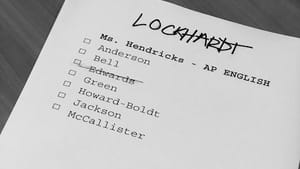Stay in the Loop
BSR publishes on a weekly schedule, with an email newsletter every Wednesday and Thursday morning. There’s no paywall, and subscribing is always free.
Locked down too soon
Philly Fringe 2018: Heart-Soul-Control Productions presents Tom England's 'Lockhardt'

Heart-Soul-Control Productions' Lockhardt, by Tom England, presents a powerful situation. A high-school AP English class is interrupted by an announcement: "Mr. Lockhardt is in the building." This coded signal means there’s an active shooter on site.
Director Ben Smallen imaginatively stages this drama on the Arden's Arcadia Stage with audience on three sides. The seven actors playing students draw outlines of locations in chalk on the black floor.
The problem is, Lockhardt doesn't take us anywhere.
All too familiar
Mass shootings in schools, from Columbine to Parkland, are common and well documented. Today, schools drill not only for fires but for active shooters roaming the halls. (When I was in elementary school, we ran nuclear-bomb drills with grim futility; today, the enemy isn't a foreign power, it's us.)
Lockhardt starts at a leisurely pace, with students making their way from hallways to classroom and the teacher, Ms. Kendricks (Amanda Curry), providing exposition in an interview spoken to the audience. They discuss Hamlet just like a class would: tentatively at first, then actively and at length. Lockhardt was originally a 10-minute play, now expanded to an hour, and the padding shows.
Finally, Ms. Kendricks must transform from literature expert to incident manager. Protocol is to lock the door and shelter in place. Everyone freaks. Mark (Mitchell Hansen) defies her and runs out. Kalem Von Camper, Malynne Smith, Lexi Thammavong, and Billy Sander create distinct, believable characters in crisis.
They fret about Kathryn (Maryellen Molnar), who went to the restroom just before the announcement. Sydney (Lauryn Morgan Thomas) wants to find her, but Ms. Kendricks resists, citing the rules.
Lockhardt builds believably while the class waits in horror. They clutch their ever-present smartphones, but the outside world provides little news and no comfort. Shots ring out as the shooter comes closer.
Nothing to spoil
And then, not much happens. The play jumps ahead to a gathering outside. Information is shared. Smallen provides a heartbeat sound plus a buzzing meant to ratchet the tension.
These effects merely distract — not only because they're too obvious, but since some voices are too small for the room, lines are lost. Most importantly, the post-shooting scenes neither advance the plot nor build suspense.
Sorrow, blame, recriminations, and what-ifs spill out. We've heard them all before. Then the setting shifts again with erasing and rechalking. We learn Ms. Hendricks's feelings in a Skype conversation with her mother, during which we only hear the teacher's side. Why don't the characters onstage talk to each other?
The students stand in formation around their teacher and, holding their Hamlet texts, read news reports and commentary. While I didn't hear the hollow cliché "thoughts and prayers," they recite familiar platitudes in hashtags. A brief flash of anger about America's gun-violence problem is lost in the din.
Presenting what we already know — though performed sincerely by these college-aged actors playing high-schoolers and Curry as the overwhelmed teacher — feels tedious because it's dramatically empty and incomplete. Focusing on survivors rather than the shooter might work, but only if we experience their struggles to cope.
Lockhardt ends at the point where it should get interesting: the part of the story we don't know. That's what a play must explore.
What, When, Where
Lockhardt. By Tom England, Ben Smallen directed. Heart-Soul-Control Productions. Through September 15, 2018, at the Arden Theatre's Arcadia Stage, 40 N. Second Street, Philadelphia. (215) 413-1318 or fringearts.com.
Sign up for our newsletter
All of the week's new articles, all in one place. Sign up for the free weekly BSR newsletters, and don't miss a conversation.

 Mark Cofta
Mark Cofta